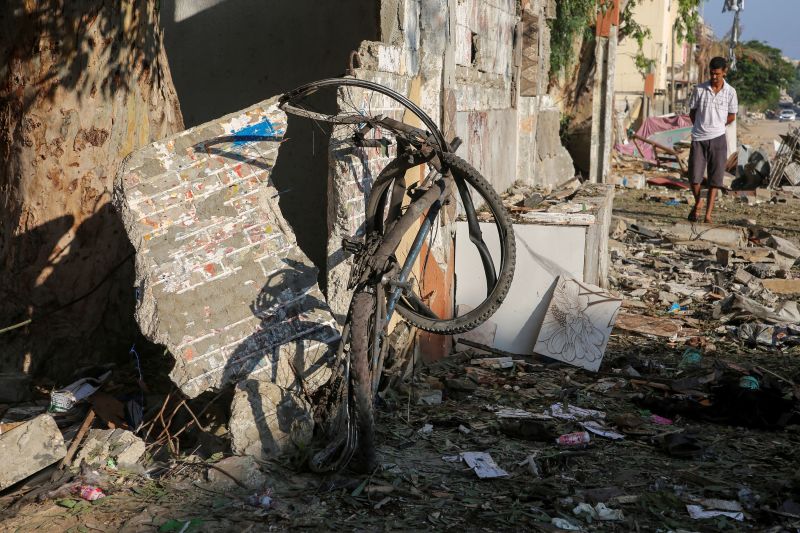July 11, 2024
CNN Analysis Reveals Deadly Israeli Strike on School Complex Near Khan Younis Used US-Made Munitions
 The recent deadly Israeli strike on a school complex near Khan Younis, as reported by CNN analysis, has once again brought to light the grim realities of conflict in the Middle East. In particular, the revelation that US-made munitions were used in this tragic incident raises important questions about the role of American arms in the ongoing violence in the region.
The use of US-made munitions by Israeli forces is a troubling aspect of the conflict, highlighting the complex web of relationships and alliances that characterize geopolitics in the Middle East. The United States has long been a key supplier of military aid to Israel, providing billions of dollars in weapons and equipment each year. While this support is ostensibly aimed at bolstering Israel's security and defense capabilities, the reality is that American-made arms are being used in a conflict that has resulted in numerous civilian casualties and widespread destruction.
The targeting of a school complex in Khan Younis, an area populated by civilians including children, underscores the devastating impact of armed conflict on innocent lives. Schools should be places of learning and safety, not targets of military strikes. The fact that US-made munitions were used in this attack is a stark reminder of the human cost of war and the responsibilities that come with supplying arms to allies engaged in conflict.
The use of US-made munitions in the Israeli strike near Khan Younis also raises broader ethical questions about the role of arms exports in fueling violence and instability around the world. The United States is the world's largest exporter of arms, providing weapons to a wide range of countries and conflicts. While arms sales can be a lucrative business for defense contractors and governments, they also carry significant moral implications, particularly when those weapons are used in ways that violate international law or humanitarian norms.
In the case of the Israeli strike near Khan Younis, the use of US-made munitions has sparked calls for greater accountability and transparency in arms sales and exports. Critics argue that the United States should do more to prevent the misuse of American-made weapons in conflicts where civilians are at risk. This includes stricter oversight of arms transfers, stronger safeguards to ensure compliance with international humanitarian law, and mechanisms to hold both suppliers and users of weapons accountable for their actions.
The tragic events near Khan Younis serve as a stark reminder of the human toll of armed conflict and the moral dilemmas inherent in the global arms trade. As the United States and other countries grapple with the complexities of supplying weapons to allies in conflict zones, it is essential that we consider not only the strategic and geopolitical implications of arms exports, but also the ethical and humanitarian dimensions of our involvement in conflicts that result in civilian casualties and human suffering. Only by addressing these issues honestly and openly can we hope to move towards a more peaceful and just world.
The recent deadly Israeli strike on a school complex near Khan Younis, as reported by CNN analysis, has once again brought to light the grim realities of conflict in the Middle East. In particular, the revelation that US-made munitions were used in this tragic incident raises important questions about the role of American arms in the ongoing violence in the region.
The use of US-made munitions by Israeli forces is a troubling aspect of the conflict, highlighting the complex web of relationships and alliances that characterize geopolitics in the Middle East. The United States has long been a key supplier of military aid to Israel, providing billions of dollars in weapons and equipment each year. While this support is ostensibly aimed at bolstering Israel's security and defense capabilities, the reality is that American-made arms are being used in a conflict that has resulted in numerous civilian casualties and widespread destruction.
The targeting of a school complex in Khan Younis, an area populated by civilians including children, underscores the devastating impact of armed conflict on innocent lives. Schools should be places of learning and safety, not targets of military strikes. The fact that US-made munitions were used in this attack is a stark reminder of the human cost of war and the responsibilities that come with supplying arms to allies engaged in conflict.
The use of US-made munitions in the Israeli strike near Khan Younis also raises broader ethical questions about the role of arms exports in fueling violence and instability around the world. The United States is the world's largest exporter of arms, providing weapons to a wide range of countries and conflicts. While arms sales can be a lucrative business for defense contractors and governments, they also carry significant moral implications, particularly when those weapons are used in ways that violate international law or humanitarian norms.
In the case of the Israeli strike near Khan Younis, the use of US-made munitions has sparked calls for greater accountability and transparency in arms sales and exports. Critics argue that the United States should do more to prevent the misuse of American-made weapons in conflicts where civilians are at risk. This includes stricter oversight of arms transfers, stronger safeguards to ensure compliance with international humanitarian law, and mechanisms to hold both suppliers and users of weapons accountable for their actions.
The tragic events near Khan Younis serve as a stark reminder of the human toll of armed conflict and the moral dilemmas inherent in the global arms trade. As the United States and other countries grapple with the complexities of supplying weapons to allies in conflict zones, it is essential that we consider not only the strategic and geopolitical implications of arms exports, but also the ethical and humanitarian dimensions of our involvement in conflicts that result in civilian casualties and human suffering. Only by addressing these issues honestly and openly can we hope to move towards a more peaceful and just world.
If you would like to delve into the world of investment topics , go to our partner project Wall Street Wizardry


